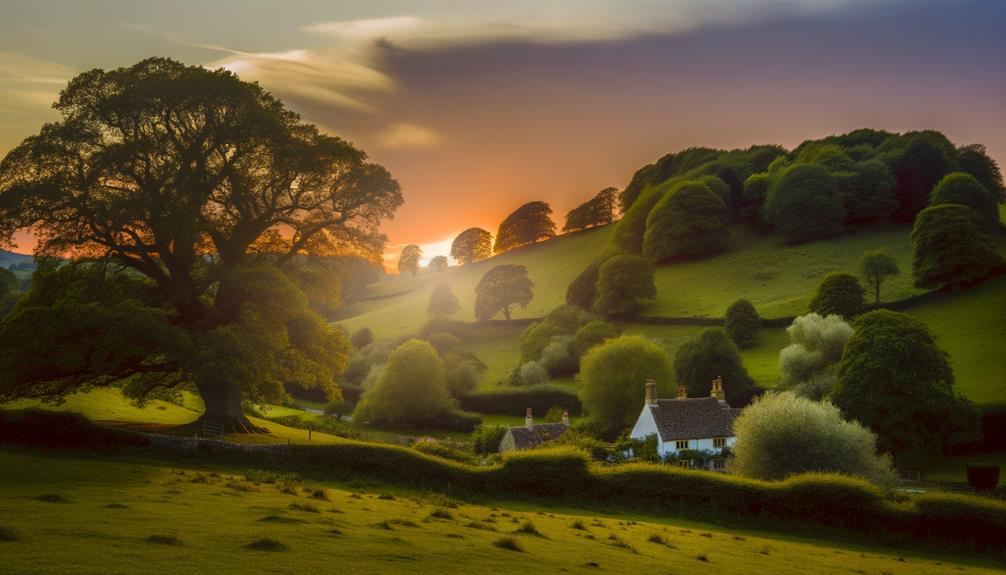Meaning of the Name Roscoe
The name Roscoe originates from Old Norse, combining 'rá' (roebuck) and 'skógr' (forest), signifying a connection to deer and woodland regions. It was popular in medieval England and later gained prominence in 19th century America, symbolizing resilience and a frontier spirit.
Notable figures named Roscoe include comedian Roscoe 'Fatty' Arbuckle and legal scholar Roscoe Pound. The name has experienced fluctuating popularity, with a modest resurgence in recent years, reflecting a trend toward vintage names.
For a deeper exploration into its cultural impact and historical layers, numerous interesting aspects await discovery.

Key Takeaways
- The name Roscoe originates from Old Norse elements meaning 'roebuck' and 'forest'.
- It suggests associations with deer and woodland, implying a rustic, natural landscape.
- Historically popular in medieval England and the 19th-century United States.
- The name has seen a resurgence in popularity with modern interest in vintage names.
- Notable namesakes include early cinema star Roscoe Arbuckle and legal scholar Roscoe Pound.
Etymology and Origin
The name Roscoe originates from Old Norse, specifically from the elements 'rá' meaning 'roebuck' and 'skógr' meaning 'forest.' This combination suggests a place associated with deer and woodland, evoking imagery of rustic, natural landscapes.
The etymology points to a geographical or topographical significance, often indicative of areas abundant in wildlife and dense forestry. Originally used as a surname, Roscoe eventually evolved into a given name. The linguistic roots highlight the importance of nature in early Norse culture, reflecting the connection between human settlements and their surrounding environment.
Understanding the origin of Roscoe provides insight into its cultural and environmental connotations, illustrating how language encapsulates the interaction between people and the natural world.
Historical Significance
Roscoe's historical significance can be traced through its usage in various cultural and societal contexts over centuries. Initially popular in medieval England, the name Roscoe was often associated with rural landscapes, particularly wooded regions, as indicated by its Old Norse roots.
During the 19th century, Roscoe gained prominence in the United States, partly due to influential figures such as Roscoe Conkling, a notable politician. The name also found favor among early American pioneers, symbolizing resilience and frontier spirit.
Additionally, Roscoe has been used in literature and historical documents, reflecting its enduring presence. The name's journey through time reveals its adaptability and persistent appeal across different eras and regions, underlining its historical depth and relevance.
Cultural References
Numerous cultural references to the name Roscoe can be found in literature, film, music, and popular media, highlighting its multifaceted impact on the arts and entertainment.
In literature, Roscoe is the lead character in William Kennedy's novel 'Roscoe,' set in Albany, New York, depicting political intrigue and personal ambition.
In film, the name appears in various roles, such as Roscoe Arbuckle, a prominent silent film comedian.
Music also embraces the name, with 'Roscoe' by Midlake, a song reflecting nostalgic themes.
Additionally, the name surfaces in television and popular media, including characters like Roscoe P. Coltrane from 'The Dukes of Hazzard.'
These references underscore the name's versatility and enduring presence across diverse cultural landscapes.
Popularity Over Time
The popularity of the name Roscoe has experienced significant shifts over time, reflecting broader historical name trends. Analyzing modern usage patterns reveals how the name has evolved in contemporary contexts, while geographic popularity shifts highlight its varying appeal in different regions.
This section explores these dynamics to provide a thorough understanding of Roscoe's standing across eras and locales.
Historical Name Trends
Historically, the name Roscoe has experienced varying levels of popularity, often influenced by cultural and societal trends.
Emerging in the late 19th century, Roscoe was a favored choice, particularly in English-speaking countries. The name saw a peak in the early 20th century, attributed to its association with notable figures and a general affinity for names with Old English origins.
However, its popularity waned mid-century as naming conventions shifted towards more modern and diverse options. By the latter part of the 20th century, Roscoe had become relatively uncommon.
Despite its fluctuating presence, the name retains a classic charm, reflecting historical and cultural layers that continue to intrigue those with an interest in traditional names.
Modern Usage Patterns
While Roscoe's historical popularity has fluctuated, modern usage patterns reveal its current standing and evolving appeal in contemporary naming conventions. The name Roscoe has seen a resurgence in recent years, attributed to a growing interest in vintage and unique names. Data from various naming databases indicate that Roscoe is gradually becoming a favored choice among new parents seeking distinctiveness in their child's name. The following table illustrates the name's popularity over the past five years:
| Year | Popularity Rank |
|---|---|
| 2018 | 980 |
| 2019 | 940 |
| 2020 | 910 |
| 2021 | 875 |
| 2022 | 840 |
This data demonstrates a steady rise in the name Roscoe's popularity, reflecting broader trends in naming practices.
Geographic Popularity Shifts
Frequently, the popularity of the name Roscoe varies greatly across different geographic regions, reflecting cultural and societal influences on naming trends.
Historically, Roscoe saw significant usage in the United States during the late 19th and early 20th centuries, particularly in rural areas. In contrast, its appeal waned in urban centers due to shifting preferences toward more contemporary names.
In the United Kingdom, Roscoe remains relatively rare but is occasionally chosen for its old-fashioned charm. Recently, a modest resurgence has been noted in parts of Australia and New Zealand, where vintage names are seeing a revival.
This geographic variability underscores the dynamic nature of naming conventions and the factors that influence them, such as migration, media representation, and historical events.
Notable Namesakes
Several prominent individuals bearing the name Roscoe have left notable imprints across various fields, from entertainment to politics.
Roscoe 'Fatty' Arbuckle stands out as a pioneering figure in early American cinema, known for his comedic genius and influence on the silent film era.
In the field of literature, Roscoe Pound, a distinguished legal scholar, played a pivotal role in the development of sociological jurisprudence.
Politics also has its notable Roscoe; Roscoe Conkling served as a powerful U.S. Senator from New York in the 19th century, shaping significant legislative reforms.
Each of these individuals illustrates the diverse impact those named Roscoe have had, contributing to their respective domains with distinction and lasting influence.
Modern Usage
In contemporary times, the name Roscoe continues to be embraced by parents seeking a distinctive and timeless name for their children. Its appeal lies in its unique blend of historical significance and modern charm.
The name Roscoe stands out for several reasons:
- Uniqueness: Unlike more common names, Roscoe offers a distinctive choice that guarantees individuality.
- Cultural Resonance: With its historical roots and famous namesakes, Roscoe carries a rich cultural heritage.
- Versatility: The name's adaptability suits various cultural and linguistic contexts, making it globally appealing.
This modern usage reflects a broader trend where classic names are revived with contemporary relevance. Parents today appreciate Roscoe not only for its unique sound but also for its enduring legacy.
Conclusion
The name Roscoe, with its roots in Old Norse and historical ties to English and American culture, has traversed centuries, embodying resilience and heritage. The name Roscoe originated from the Old Norse words “hross” meaning horse and “kofi” meaning hut, reflecting a strong connection to nature and the environment. Throughout history, the name has been borne by kings, writers, and innovators, solidifying its place in English and American culture. In modern times, it continues to be a popular choice for parents seeking a name that exudes strength and tradition. Additionally, the name Rodney has also been associated with valor and determination, further adding to the legacy of these timeless monikers.
Its appearance in literature and media, alongside notable figures bearing the name, underscores its lasting imprint. Despite fluctuations in popularity, Roscoe persists like a sturdy oak in a forest, symbolizing endurance and timeless appeal.
Understanding its multifaceted background enriches the appreciation of this venerable name.






